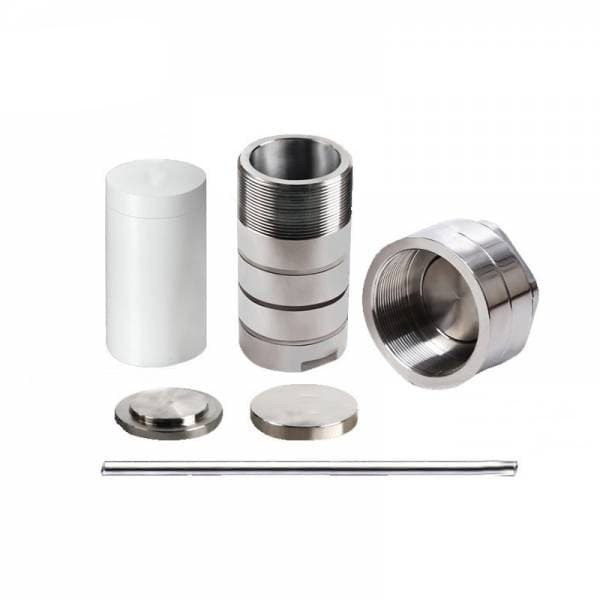
High Pressure Reactor
High Pressure Laboratory Autoclave Reactor for Hydrothermal Synthesis
Item Number : KR-3H
Price varies based on specs and customizations
- Reactor material
- 304/316L Stainless Steel
- Liner material
- PTFE / PPL
Shipping:
Contact us to get shipping details Enjoy On-time Dispatch Guarantee.
Why Choose Us
Easy ordering process, quality products, and dedicated support for your business success.
Applications
Hydrothermal synthesis reactor is a small reactor commonly used in chemical laboratories, which can be used for small-scale synthesis reactions; it can also use the strong acid or alkali in the tank and the high temperature, high pressure and airtight environment to achieve the purpose of rapid digestion of insoluble substances.
Detail & Parts
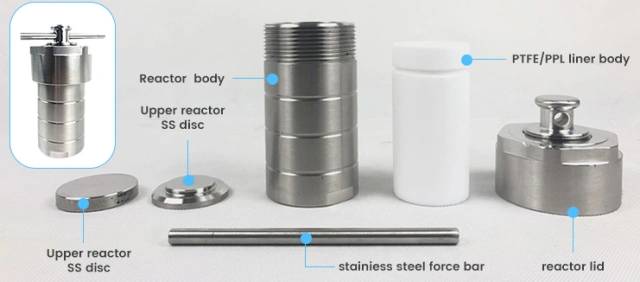
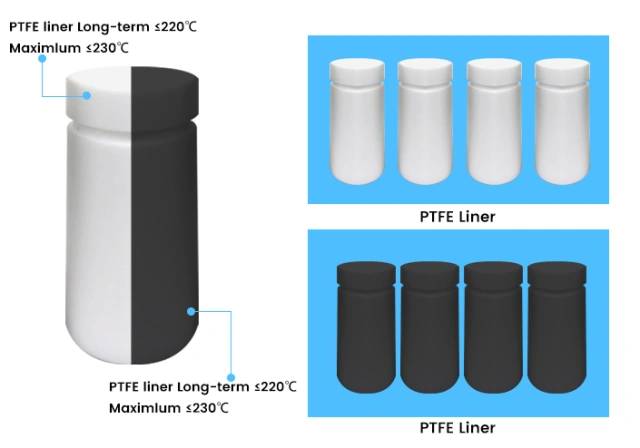
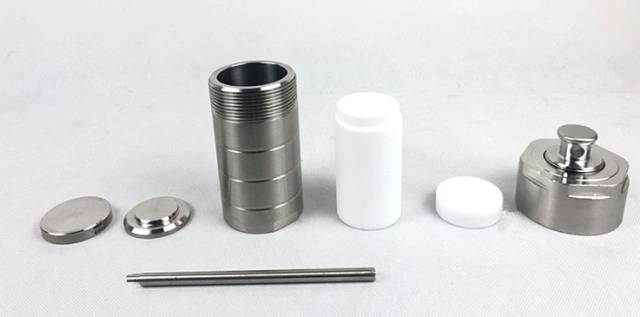
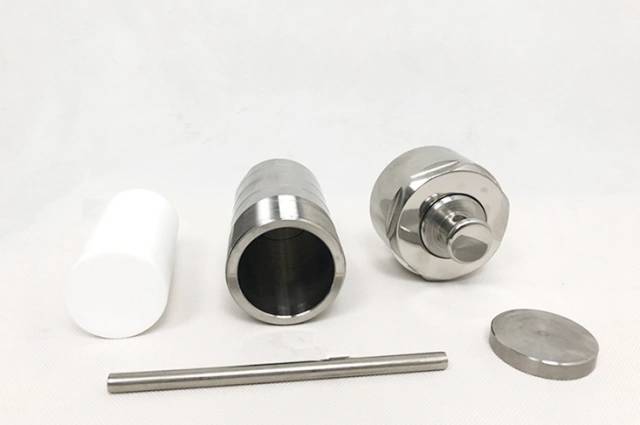
Features
- Good corrosion resistance, no harmful substances overflow, reduce pollution, and safe to use.
- After heating and pressure increase, it can quickly and without damage to dissolve samples that are difficult to dissolve under normal conditions and samples containing volatile elements.
- The appearance is beautiful, the structure is reasonable, the operation is simple, the analysis time is shortened, and the data is reliable.
- PTFE liner inside, which can produce care and is resistant to acids and alkalis.
- It can replace the platinum crucible to solve the problem of sample dissolution in the analysis of trace elements in high-purity alumina.
Technical specifications
| Model | 50ml | 100ml | 150ml | 200ml | 250ml | 300ml | 400ml | 500ml |
| Reactor material | 304/316L Stainless Steel | |||||||
| Reactor inner size(mm) | Ø40*86 | Ø49*105 | Ø58*125 | Ø63*145 | Ø65*145 | Ø71*147 | Ø81*148 | Ø91*148 |
| Reactor outer size(mm) | Ø53*93 | Ø63*113 | Ø78*135 | Ø83*155 | Ø83*155 | Ø91*157 | Ø103*162 | Ø117*162 |
| Liner material | PTFE/PPL | |||||||
| Liner inner size(mm) | Ø30*69 | Ø39*84 | Ø45*99 | Ø47*118 | Ø52*121 | Ø56*124 | Ø65*122 | Ø75*121 |
| Liner outer size(mm) | Ø40*78 | Ø49*95 | Ø58*114 | Ø63*115 | Ø65*135 | Ø71*137 | Ø81*137 | Ø91*17 |
| Rod size(mm) | Ø8*200 | |||||||
| Overall size(mm) | 65*139 | 75*160 | 97*185 | 107*205 | 107*205 | 110*210 | 120*215 | 135*215 |
| Overall weight(Kg) | 1.65 | 2.4 | 4.8 | 6.1 | 6.1 | 6.7 | 8.1 | 10.6 |
Usage Process
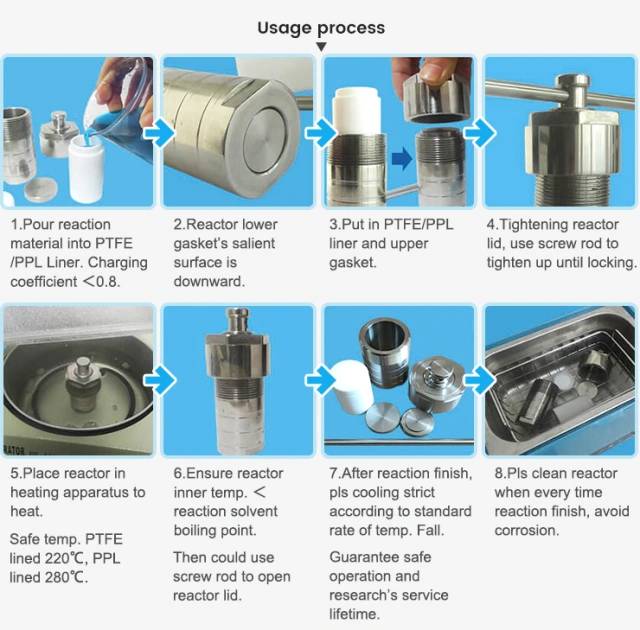
Warnings
Operator safety is the top important issue! Please operate the equipment with cautions. Working with inflammable& explosive or toxic gases is very dangerous, operators must take all necessary precautions before starting the equipment. Working with positive pressure inside the reactors or chambers is dangerous, operator must fellow the safety procedures strictly. Extra caution must also be taken when operating with air-reactive materials, especially under vacuum. A leak can draw air into the apparatus and cause a violent reaction to occur.
Designed for You
KinTek provide deep custom made service and equipment to worldwide customers, our specialized teamwork and rich experienced engineers are capable to undertake the custom tailoring hardware and software equipment requirements, and help our customer to build up the exclusive and personalized equipment and solution!
Would you please drop your ideas to us, our engineers are ready for you now!
Trusted by Industry Leaders

FAQ
What Is A High Pressure Reactor?
What Is An Autoclave Sterilizer?
What Causes An Increase In Pressure Within A High-pressure Reactor?
Increasing pressure inside a pressure reactor can be achieved through various means. One common method is by heating a sealed pressure vessel, where temperature and pressure increase proportionately, impacting reaction kinetics. Alternatively, the reaction occurring inside the vessel can induce pressure, and agitation can accelerate this process.
In situations where heating is unsuitable or insufficient pressure is generated, manual pressurization is possible with a compressed gas source, such as a compressor or a pre-compressed canister of inert gas.
Pressure reactors utilize pressure relief valves to safely regulate and maintain pressure, emphasizing their reliable and safe operation.
How Does An Autoclave Sterilizer Work?
How Does A Pressure Reactor Work?
What Are The Advantages Of Using Autoclave Sterilizers?
What Safety Precautions Should Be Taken When Using Autoclave Sterilizers?
Can All Materials And Items Be Sterilized Using Autoclave Sterilizers?
Are There Different Types Of Autoclave Sterilizers Available?
4.8 / 5
The reactor is well-made and sturdy. It performs as expected.
4.9 / 5
The delivery was fast and the reactor was packaged well. I'm impressed with the quality of the product.
4.7 / 5
The reactor is easy to use and clean. It has made my experiments much easier.
5.0 / 5
The reactor is a great value for the price. It's durable and has all the features I need.
4.6 / 5
The reactor is technologically advanced and has helped me to improve my research.
4.8 / 5
The reactor is a great addition to my laboratory. It's helped me to speed up my experiments.
4.9 / 5
I'm very happy with the reactor. It's well-made and works great.
5.0 / 5
The reactor is the perfect tool for my research. It's easy to use and gives me accurate results.
4.7 / 5
The reactor is a great investment. It's helped me to save time and money.
4.8 / 5
The reactor is a must-have for any laboratory. It's versatile and can be used for a variety of experiments.
REQUEST A QUOTE
Our professional team will reply to you within one business day. Please feel free to contact us!
Related Products

Stainless High Pressure Autoclave Reactor Laboratory Pressure Reactor
Discover the versatility of Stainless High Pressure Reactor - a safe and reliable solution for direct and indirect heating. Built with stainless steel, it can withstand high temperatures and pressures. Learn more now.

Mini SS High Pressure Autoclave Reactor for Laboratory Use
Mini SS High Pressure Reactor - Ideal for medicine, chemical, and scientific research industries. Programmed heating temp and stirring speed, up to 22Mpa pressure.

Customizable High Pressure Reactors for Advanced Scientific and Industrial Applications
This laboratory-scale high-pressure reactor is a high-performance autoclave engineered for precision and safety in demanding research and development environments.

Laboratory High Pressure Steam Sterilizer Vertical Autoclave for Lab Department
Vertical pressure steam sterilizer is a kind of sterilization equipment with automatic control, which is composed of heating system, microcomputer control system and overheating and overpressure protection system.

Laboratory High Pressure Horizontal Autoclave Steam Sterilizer for Lab Use
The horizontal autoclave steam sterilizer adopts the gravity displacement method to remove the cold air in the inner chamber, so that the inner steam and cold air content is less, and the sterilization is more reliable.

Desktop Fast High Pressure Laboratory Autoclave Sterilizer 16L 24L for Lab Use
The desktop fast steam sterilizer is a compact and reliable device used for rapid sterilization of medical, pharmaceutical, and research items.

Warm Isostatic Press WIP Workstation 300Mpa for High Pressure Applications
Discover Warm Isostatic Pressing (WIP) - A cutting-edge technology that enables uniform pressure to shape and press powdered products at a precise temperature. Ideal for complex parts and components in manufacturing.

Custom PTFE Teflon Parts Manufacturer for Hydrothermal Synthesis Reactor Polytetrafluoroethylene Carbon Paper and Carbon Cloth Nano-growth
Acid and alkali resistant polytetrafluoroethylene experimental fixtures meet different requirements. The material is made of brand new polytetrafluoroethylene material, which has excellent chemical stability, corrosion resistance, airtightness, high lubricity and non-stickiness, electrical corrosion and good anti-aging ability, and can work for a long time at temperatures from -180℃ to +250℃.

Portable High Pressure Laboratory Autoclave Steam Sterilizer for Lab Use
Portable autoclave sterilization pressure is a device that uses pressure saturated steam to quickly and effectively sterilize items.

Laboratory High Pressure Vacuum Tube Furnace
KT-PTF High Pressure Tube Furnace: Compact split tube furnace with strong positive pressure resistance. Working temp up to 1100°C and pressure up to 15Mpa. Also works under controller atmosphere or high vacuum.

1700℃ Laboratory High Temperature Tube Furnace with Alumina Tube
Looking for a high-temperature tube furnace? Check out our 1700℃ Tube Furnace with Alumina Tube. Perfect for research and industrial applications up to 1700C.

Laboratory Sterilizer Lab Autoclave Vertical Pressure Steam Sterilizer for Liquid Crystal Display Automatic Type
Liquid crystal display automatic vertical sterilizer is a safe, reliable and automatic control sterilization equipment, which is composed of heating system, microcomputer control system and overheating and overvoltage protection system.

Anti-Cracking Press Mold for Lab Use
The anti-cracking press mold is a specialized equipment designed for molding various shapes and sizes of film using high pressure and electric heating.

Portable Digital Display Automatic Laboratory Sterilizer Lab Autoclave for Sterilization Pressure
Portable autoclave sterilization pressure is a device that uses pressure saturated steam to quickly and effectively sterilize items.

Desktop Fast Laboratory Autoclave Sterilizer 20L 24L for Lab Use
The desktop fast steam sterilizer is a compact and reliable device used for rapid sterilization of medical, pharmaceutical, and research items.

Laboratory Sterilizer Lab Autoclave Pulsating Vacuum Desktop Steam Sterilizer
The pulsating vacuum desktop steam sterilizer is a compact and reliable device used for rapid sterilization of medical, pharmaceutical, and research items.

Laboratory Horizontal Autoclave Steam Sterilizer Lab Microcomputer Sterilizer
The horizontal autoclave steam sterilizer adopts the method of gravity displacement to remove the cold air in the inner chamber, so that the content of steam cold air in the inner chamber is less, and the sterilization is more reliable.

Laboratory Sterilizer Lab Autoclave Pulse Vacuum Lifting Sterilizer
The pulse vacuum lifting sterilizer is a state-of-the-art equipment for efficient and precise sterilization. It uses pulsating vacuum technology, customizable cycles, and a user-friendly design for easy operation and safety.

Laboratory Sterilizer Lab Autoclave Herbal Powder Sterilization Machine for Plant
The herbal powder sterilization autoclave machine for Chinese medicine uses saturated steam for effective sterilization. It utilizes the heat and penetrative properties of steam, achieves sterilization after heat preservation, and maintains a good drying effect with a dedicated drying system.
Related Articles

Comprehensive Guide to Rotating Disk Electrode (RDE) in Electrochemical Studies
Explore the detailed workings, applications, and significance of Rotating Disk Electrodes (RDE) in electrochemical research. Discover how RDEs are used in fuel cells, catalyst development, and more.

10 Essential Safety Steps for Pressure Reactor Use in Laboratories
Safety is paramount when conducting chemical reactions under pressurized conditions. It is important to carefully prepare pressure reactors and laboratory safety equipment to prevent potential hazards that, if not controlled, can have catastrophic consequences. In order to ensure the safety of using a pressure reactor, it is important to understand the specifications of the reactor. Become familiar with the chemistry of the reactor material and make sure it is chemically resistant enough to withstand the substances used in the reaction.

Hydrogen Atmosphere Furnaces: Applications, Safety, and Maintenance
Explore the comprehensive guide on hydrogen atmosphere furnaces, including their applications in high-end alloy sintering, safety measures, and maintenance tips. Learn about the types, components, and operational considerations for optimal performance.

Revolutionize Your Spectroscopy Analysis with FTIR Pellet Press
FTIR (Fourier Transform Infrared) spectroscopy is a widely used technique to analyze the chemical composition of various materials. This method is particularly useful for samples that are difficult to analyze using other techniques.

5 Essential Applications of Rotary Evaporator in Labs
Rotary evaporators, also known as rotovaps, are laboratory instruments used for distillation, concentration, and purification of samples. They are widely used in the chemical, pharmaceutical, and food and beverage industries for various applications.

Laboratory Safety: High Pressure Equipment and Reactors
This article discusses safety measures and precautions for using high pressure equipment and reactors in laboratories, including case studies and detailed usage instructions.

Basic Laboratory Reaction Equipment
Overview of essential lab equipment for chemical reactions under various conditions.

Commonly Used Organic Experimental Reaction Devices
Overview of various devices used in organic experiments to facilitate reactions and improve yields.

Laboratory Sample Preparation and Digestion Equipment
Overview of essential lab equipment for sample preparation and digestion.

Laboratory Safety: Safe Use of High Voltage Equipment
Guidelines for the safe operation of high-pressure equipment in laboratories, including reactors, hydrothermal reactors, autoclaves, and gas cylinders.

Essential Tips for Conducting Organic Synthesis Reactions
Guidelines for selecting apparatus, solvents, dosing sequences, quenching, and post-processing in organic synthesis.

Choosing the Right Heating Method for Laboratory Experiments
Discusses different heating methods in labs and their suitability for various experiments.